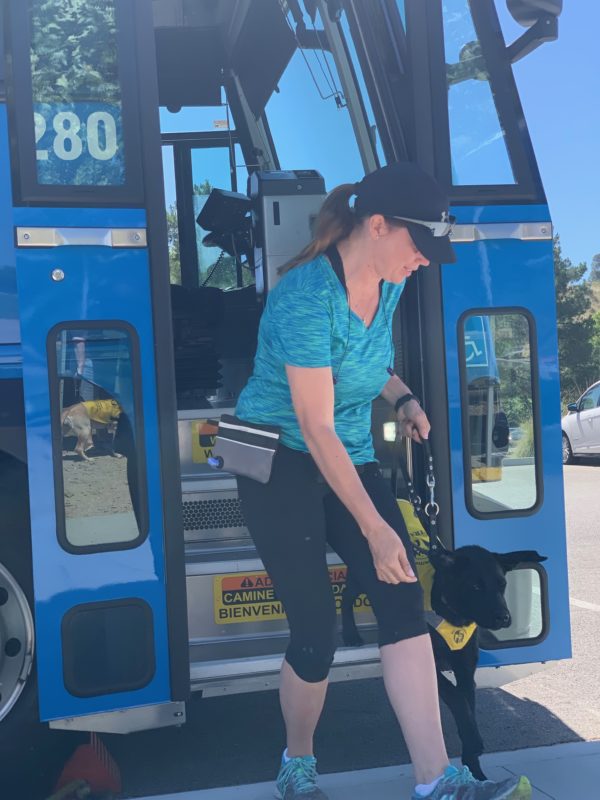Puppies-in-training with the Guide Dogs of America’s (GDA) Sylmar puppy group hopped on and off various Santa Clarita Transit buses on Saturday for a training session.
The puppies and their “puppy raisers” rode through Central Park on out of service buses provided by the city as they learned to navigate the sights, sounds, smells and surfaces commonly found on public transit.
“It’s a good learning opportunity for everyone, not just the dogs,” said Alex Porlier, City of Santa Clarita administrative analyst. “It’s a good way for our operators to figure out how to respond when a dog is boarding a bus. That’s why we bring out our road supervisor and bus driver so they can learn and bring it back out to the rest of the operators.”

Puppies in training, Hazel, left, and Ilene, right. 
Emily Alvarenga/The Signal
Those who are visually impaired typically rely heavily on public transit, according to Hanna Belyea, canine development assistant. This type of training helps to prepare the puppies to utilize public transit as working dogs in the near future, she said.
“It’s really good exposure for a young-aged puppy to get used to it so that when they graduate they’re ready,” Belyea said.
Puppies, from six to 12 months of age, practiced boarding and exiting the bus with distractions from other “passengers,” settling calmly out of walkways and at their handler’s feet, utilizing wheelchair lift mechanisms or other ramp devices they may encounter, and experiencing the loud noises buses commonly make.

Puppy raisers were also given pointers on how to teach the puppies what to do, including going “slow and steady” as well as encouraging the pups to move forward down the row, and were then able to ask questions.
Nine-month-old Brady is puppy raisers Monique and Gene Newman’s 14th puppy.
“We’ve become serial puppy raisers,” she said, laughing. “It’s the total package of loving Labradors, having had friends who have dealt with visual impairment and seeing what a difference these dogs can make … We’ve learned how to speak Labrador.”

Monique said throughout her time with GDA, they have been developing the training program more and more.
“We never feel like we’re finished products,” she added. “We are constantly learning new ways to encourage our dogs to have the best behaviors possible.”
Puppy raiser Alisha Feness was working Castle during the exercise as her dog was in heat and not able to attend.

“It’s different handling other (raiser’s) puppies,” Feness said. “You know how your dog handles, but then you get somebody else’s and it’s a little different.”
“One of the benefits of having another puppy raiser handle your dog is that the puppy gets used to working with a different handler,” said Suzanne Breaw, area co-leader and Castle’s puppy raiser.
Guide Dogs of America are always looking for more puppy raisers, for more information, visit guidedogsofamerica.org/gda-programs/puppy-raising/.
















